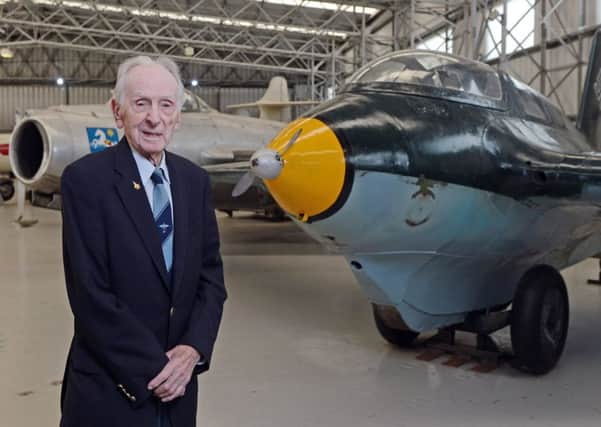Leith hero pilot Eric '˜Winkle' Brown an inspiration to the end


Leith-born Captain Eric “Winkle” Brown, who died last month aged 97, was the Navy’s most decorated pilot and had flown 487 types of aircraft.
Mourners at the private ceremony at Surrey and Sussex Crematorium included the First Sea Lord Admiral Sir George Zambellas and other military representatives.
Advertisement
Hide AdAdvertisement
Hide AdTributes were paid by Capt Brown’s friend and biographer Colonel Paul Beaver and the test pilot’s grand-daughter Melanie Satisky, who read the well-known aviation poem High Flight.
Col Beaver told those gathered how Capt Brown always had time for his family, and also read extracts from a letter sent by an 11-year-old boy from Dorchester who described the pilot as his “hero”.
Speaking after the funeral Col Beaver said: “Eric encouraged him, telling him to do maths and physics and to keep physically fit to help him become a naval test pilot in the future.”
The boy, who began writing and sending drawings to Capt Brown two years ago, told the pilot’s family he was “devastated” he would never get to meet someone he admired so much.
Advertisement
Hide AdAdvertisement
Hide AdAlso among the mourners were members of the many clubs and societies Capt Brown was associated with, including The People’s Mosquito of which he was a patron.
A Royal Marines’ bugler sounded the Last Post as Capt Brown’s coffin was committed.
Capt Brown, who spent his final years living in Sussex, enjoyed a colourful career spanning three decades.
He gained three Guinness World Records – for the most types of aircraft flown, being the first man to land and take off a jet aircraft from an aircraft carrier, and the most landings on a carrier.
Advertisement
Hide AdAdvertisement
Hide AdHe cheated death on a number of occasions, surviving being sunk by a U-boat in 1941, and later being shot at and injured by a German long-range bomber.
At the end of the Second World War he saw the liberation of Bergen-Belsen concentration camp, and later used his German language skills to question some of the most prominent Nazis, including Hermann Goring and Heinrich Himmler.
Following Capt Brown’s death British astronaut Tim Peake tweeted a tribute from space calling him a “true inspiration” and “to my mind the greatest test pilot who has ever lived”.
Capt Brown is survived by his partner Jean Kelly Brown, son Glenn and daughter-in-law Ros.
Calls have been made since his death for a permanent memorial to be established in Leith.